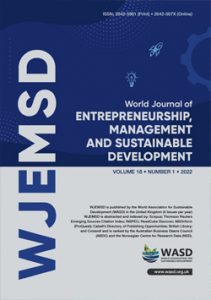An exploratory study of entrepreneurship barriers: the case of Qatar, Dr. Boumediene Kebaili, Saif Al-Subyae, Fahed Al-Qahtani and Zakariya Belkhamza
 Dr. Boumediene Kebaili, Saif Saeed Al-Subyae, Fahed Al-Qahtani
Dr. Boumediene Kebaili, Saif Saeed Al-Subyae, Fahed Al-Qahtani
Department of Management
Ahmed Bin Mohamed Military College, Doha
Qatar
Zakariya Belkhamza
Faculty of Business, Economics and Accountancy
University Malaysia Sabah, Kota Kinabalu
Malaysia
Email: kebaili@abmmc.edu.qa
DOI: 10.1108/WJEMSD-03-2015-0014
Purpose: The purpose of this paper is to explore the major entrepreneurship barriers facing Qataris. Qatar has a very specific economic and cultural environment that is different from any other Arab or western country. Such differences may contribute to the existing literature regarding entrepreneurship barriers in the Middle East.
Design/methodology/approach: A qualitative methodology was adopted. Semi-structured interviews were conducted with final year business students. Face-to-face in-depth interviews were used in order to uncover all aspects related to the research objective from the students’ perspective.
Findings: Seven factors were identified as the main barriers to start-up new business activities among Qataris, which are: the non-availability of funds, risk avoidance, fear of failure, market barriers, knowledge barriers, stress avoidance, and attitude towards change.
Research limitations/implications: It will be very useful to conduct a comparative study that covers more Gulf Cooperation Council countries to see whether the findings can be generalised to them. Furthermore, since this study adopted a qualitative approach, it will be interesting to empirically test these findings using a quantitative method.
Practical implications: The government needs to ease and facilitate the loans, by establishing a government fund for financing new businesses. Learning institutions have an important role to reduce these barriers. Indeed, promoting a healthy culture that encourages and promotes entrepreneurship can be achieved by including specialised entrepreneurship courses into students’ curriculum as early as primary schools. Government can also allocate certain percentage of contracts to new or small companies. This will ease market access. Business associations must also play their part by providing assistance, and provide training programmes tailored to the need of local potential entrepreneurs.
Originality/value: The paper contributes to the entrepreneurship body of knowledge by providing insight from the Qatari-specific economic and social environment context.
Keywords: SMEs; Entrepreneurship; Qatar; Gulf cooperation council (GCC); Start-up activities.
Citation: Kebaili, B., Al-Subyae, S.S., Al-Qahtani, F. and Belkhamza, Z. (2015), "An exploratory study of entrepreneurship barriers: the case of Qatar", World Journal of Entrepreneurship, Management and Sustainable Development, Vol. 11 No. 3, pp. 210-219. https://doi.org/10.1108/WJEMSD-03-2015-0014

